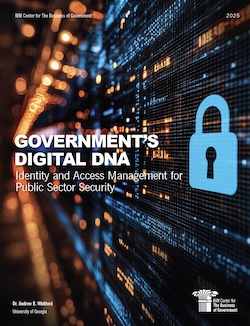
Government’s Digital DNA: Identity and Access Management for Public Sector Security

This report, Government’s Digital DNA: Identity and Access Management for Public Sector Security, authored by Professor Andrew B. Whitford of the University of Georgia, offers a timely and insightful exploration of how IAM serves more than ever as a cornerstone for effective governance in the face of evolving threats and technological advancements. The report assesses prior and current events impacting IAM in government, introduces new findings, and makes recommendations for adapting IAM in the context of emerging technologies like artificial intelligence and advanced analytics.
Professor Whitford’s analysis underscores the critical role of IAM in aligning with federal mandates, such as the Federal Information Security Modernization Act (FISMA) and the principles of Zero Trust Architecture (ZTA). By emphasizing continuous verification, least privilege access, and real-time monitoring, IAM systems provide a vital defense against insider threats, sophisticated cyberattacks, and emerging risks like AI-enabled breaches and quantum computing vulnerabilities. The report also highlights the growing convergence of information technology and operational technology, which introduces new complexities for securing interconnected systems that underpin public services and critical infrastructure.
Through a detailed examination of six key challenges facing identity management in the public sector, this report not only identifies the hurdles but also proposes six actionable recommendations to guide the future of IAM. These insights are particularly valuable as agencies strive to balance security, compliance, and operational efficiency in a rapidly changing digital landscape. By addressing the integration of advanced technologies and the evolving nature of governance, Professor Whitford’s work provides a forward-looking framework for policymakers, practitioners, and scholars alike.
The IBM Center for The Business of Government is proud to present this report as part of our commitment to advancing knowledge and practice in public administration. We believe it will serve as a critical resource for government leaders seeking to strengthen cybersecurity, enhance public trust, and navigate the complexities of modern governance.



